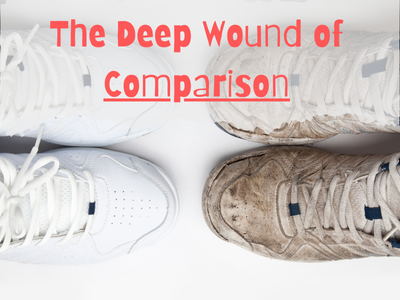I sat watching my 52-year-old client cry like her heart was breaking. She was hurting from a wound inflicted years back in her childhood and early teens when she did not do well in school.
She was not academically inclined, which led to her being compared to “better and brighter” people – her siblings at home, her peers in school, and later by the man she loved. She received advice, rebuke and judgement but not a word of acceptance or understanding. Though she tried her best, she could not perform as well as her siblings at school and her other extraordinary talents in art were ignored completely.
Her story made me recall many of my classmates from my school time. They were the “weak” students who were often publicly embarrassed by teachers.
I recalled my son’s cricket coach, and how his strategy for inspiring my son was to compare him to others on the team.
I recalled my sister once telling me how she was compared to me by our father and how hurtful that was.
Our culture defines a person’s worth by academic scores, salaries, job positions, and fame. As a society, we are besotted with children’s academic performance. Other talents are either treated as hobbies or distractions.
Though the times are changing and newer models of success are showing up, children who don’t do well in school face significant pressure and cruelty, often from people they love the most or seek approval from. These wounds of rejection, humiliation, criticism, pressure, and comparison run deep. They throw a shadow on the individual’s behaviour and abilities even in adulthood and erode their self-confidence.
In the coaching session, I asked my client to choose a prop for her 13-year-old self. I invited her to comfort that child and speak to her from her current age. As she held the prop tightly to her chest, tears of remorse flowed unendingly for a while. With gentle prodding, she expressed love and acceptance to the hurting inner child, acknowledged her pain, apologised for what she went through, and finally, proudly shared how far the child had come. Together, we celebrated and honoured her journey.
Violence has many forms. Comparison is one, often used under the guise of encouragement and motivation. I hope reading this post makes you reconsider your strategies to motivate children and friends. Could you, unintentionally, be wounding their gentle hearts?
In the upcoming online 21-Day Back to Health program, participants are invited to join 30-minute commitment circles at 5 AM. This is to establish a habit of rising early and also an opportunity to delve deeper into the issues of the mind and heart. One circle that always resonates is the judgements we receive and the stories we create about ourselves from our perception.
Holistic health cannot be achieved without attending to the emotional and mental baggage we hold. If you would like to explore a wholesome path to improved health, join us on 9th August. Learn more about the 21-Day Back to Health Program and register here.

